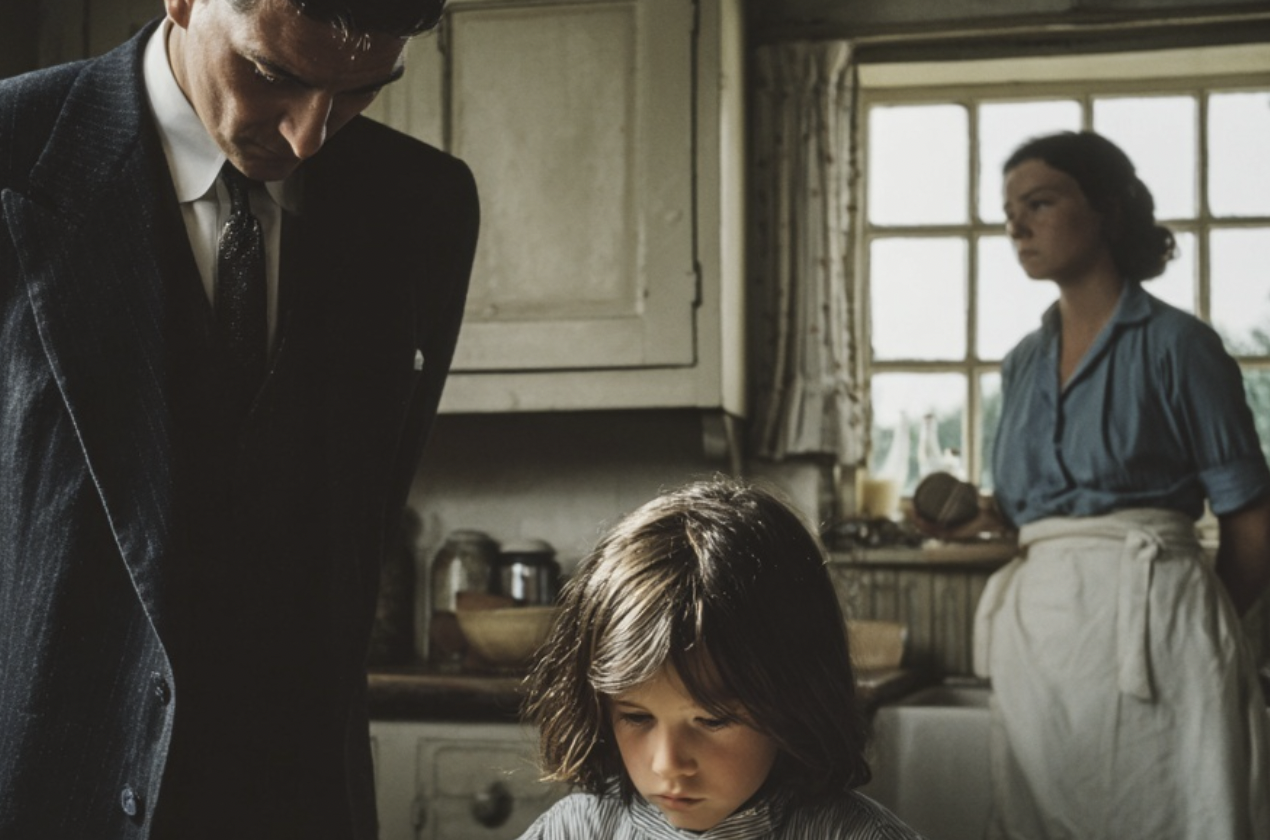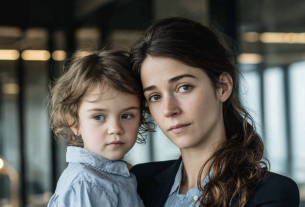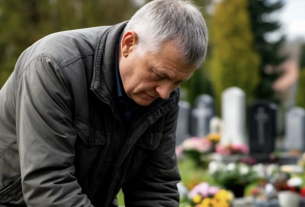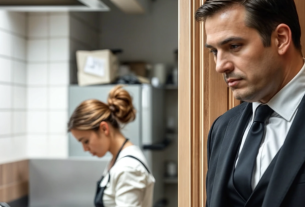It was one of those gray, colorless days when the sky seemed to press the earth down with its weight. A day when even the air felt heavy, and the birds were too tired to sing.
Maria, a young maid in the Lanskoy household, had just finished sweeping the marble steps at the front entrance. The house—more precisely, the entire estate—was for her a place of work and strict rules. She lived here like a shadow: always in motion, always silent, always aside. Her hands were red from the cold, her apron still dusty, yet her heart remained soft. Stubbornly kind.
When she bent to shake out the mat, her eyes caught on something by the gate. A boy stood there. Small, thin, barefoot. Dirty knees, narrow shoulders, an empty stare. He said nothing, just looked through the ironwork at the warm house behind her.
Maria froze. Her heart clenched. Thoughts rushed through her head: “What if someone notices? What if the butler complains? What if the master finds out?”
But at the gate stood a child, with hunger frozen in his eyes.
She glanced around quickly. The butler was gone, the guards were on break, and Mr. Lanskoy usually returned late at night.
Maria made up her mind. She opened the little side gate and whispered:
— Just for a little while…
A few minutes later the boy was sitting at the kitchen table. His thin hands gripped a bowl of hot porridge and a slice of bread. He ate so ravenously, as if afraid the food would disappear if he blinked. Maria stood by the stove, watching. And praying no one would come in.
But the door opened.
Mr. Lanskoy came home early.
He took off his coat, loosened his tie, and followed the sound of a spoon tapping porcelain. Suddenly he saw—a barefoot boy at his table. And beside him—Maria, pale, clutching a cross at her throat.
— Sir, I… I can explain… — she whispered, her voice shaking.
But he said nothing. He only looked.
And what happened next changed their lives forever.
⸻
Maria stood rooted to the spot, bracing for a shout, anger, an order to throw her out along with the boy. But Yakov Lanskoy, billionaire, master of this vast house, did not say a word. He stepped closer, glanced at the child, and suddenly slipped off his wristwatch and set it on the table.
— Eat, — he said quietly. — You can tell me after.
Maria could not believe her ears. His voice was usually cold and authoritative, but now there was something different in it.
The boy looked up. His pupils widened with fear, but he went on eating. Maria gently laid her hand on his shoulder.
— Sir, it’s not what you think… — she began.
— I’m not thinking anything, — he cut in. — I’m listening.
⸻
Maria drew a deep breath.
— I found him at the gate. He was barefoot, hungry… I couldn’t walk past.
She braced for condemnation. But Yakov sat down across from the boy and studied him for a long time. Then, unexpectedly, he asked:
— What’s your name?
The child froze, clenched the spoon, as if ready to snatch the food and run.
— Artyom, — he murmured almost inaudibly.
Yakov nodded.
— Where are your parents?
The boy lowered his head. Maria felt her heart tear with pity. She hurried to intervene:
— He’s probably not ready to talk.
But Artyom still answered:
— Mom’s gone. And Dad… he drinks. I left.
The silence that followed was heavier than any explanation.
⸻
Maria expected Lanskoy to call the police or order social services. But he simply pushed the bowl aside and said:
— Come.
— Where? — Maria didn’t understand.
— To my room. I have something for him.
She looked at the master in surprise. Lanskoy rarely allowed anyone to cross into his private apartments. Even the staff entered only with his permission.
But he took the boy by the hand and led him upstairs.
⸻
In the dressing room Yakov pulled out a sweater and a pair of sweatpants.
— They’re a couple of sizes too big, but they’ll do, — he said, handing the clothes to Artyom.
The boy put them on without a word. They really were too big, but warmth settled over his shoulders. For the first time that evening he almost smiled.
Maria stood in the doorway, amazed.
— Sir, I… I didn’t expect this from you…
— Do you think I don’t have a heart? — he snapped suddenly.
Maria flushed.
— Forgive me, that’s not what I meant…
Lanskoy sighed and rubbed his face wearily.
— I once sat hungry, little, on the steps of someone else’s house. I waited for someone to notice. No one did.
Maria went still. It was the first time she had heard anything at all about his past.
— Is that why you’re so… hard? — she asked carefully.
— That’s why I became what I am, — he answered coldly. But his eyes said otherwise.
⸻
That night the boy fell asleep in a guest room. Maria sat with him until he drifted off, then returned to the kitchen.
Yakov was waiting there.
— You risked your job letting him in, — he said.
— I know, — she replied. — But I couldn’t do otherwise.
— Why?
She looked straight into his eyes.
— Because once I too had no one who would give me a bowl of soup.
Lanskoy was silent for a long time. Then he said quietly:
— All right. We’ll keep him here for now.
Maria couldn’t believe her ears.
— What? Are you serious?
— Tomorrow I’ll deal with the paperwork. If he doesn’t want to go back home, we’ll find a way.
Maria felt tears rise. She lowered her head so he wouldn’t see.
⸻
The days that followed changed the whole house.
The boy came alive before their eyes. He helped Maria in the kitchen, sometimes even smiled, and even the butler—usually strict and stiff—softened when he saw the boy trying.
And Lanskoy… unexpectedly, he started coming home earlier.
Sometimes he sat at the table with them. Sometimes he asked Artyom about school, about what he liked. And for the first time, children’s laughter rang through the house.
⸻
But one evening a man came to the estate. Tall, battered-looking, clothes reeking of alcohol. He said:
— He’s my son. Give him back.
Artyom turned pale and hid behind Maria’s back.
— He ran off on his own, — the man said. — But he’s still my kid.
Maria wanted to argue, but Yakov spoke first.
— Your child came here barefoot and hungry. If you want to take him, prove you can care for him.
The man laughed.
— Who are you to tell me what to do?
— I’m the one who can give him a home. And you’re the one who lost him.
The conversation was harsh. But in the end the man left, threatening to return.
Maria trembled with fear.
— What will happen now? — she asked.
— Now, — Yakov said firmly, — we’ll fight for him.
⸻
Days turned into weeks. Paperwork, court, social service inspections… All that time Artyom stayed in the house. He became part of this family—a family that hadn’t existed before.
Maria cared for him as if he were her own son. And Yakov… he changed.
One evening Maria found him in his study. He sat by the window, looking out at Artyom sleeping in the garden.
— You know, — he said, — I always thought money was everything. But it seems I’m finally beginning to understand that it means nothing if you have no one to live for.
Maria smiled.
— Then he changed you too.
— No, — Yakov replied. — You did.
She froze. Their eyes met, and in that look there was more than words could say.
⸻
The court ruled that Artyom’s father had no right to take the child. Lanskoy was officially appointed his guardian.
That day the boy called him “Dad” for the first time.
Yakov turned away, hiding his tears. And Maria stood beside him, understanding: her decision to open the gate on that cold day had changed everything.
It had changed all three of them.
Now it was their home. Their family. Their new life.
⸻
A New Life
Winter dragged on. Every morning began with the same small routines: Maria made breakfast, Artyom ran to the kitchen before the bell could ring, and Yakov appeared more and more often not gloomy and drained, but alive. There was a warmth in his eyes Maria had never noticed before.
She herself had changed. She no longer felt like “just” a maid in someone else’s palace. The house, once cold and severe, came to life: laughter echoed, the smell of baking filled the air, and the patter of a child’s bare feet ran down the halls.
But the court still lay ahead. And Maria knew: one misstep—and everything they had built over these weeks could collapse.
⸻
The Court Hearing
The courtroom was stuffy. Artyom sat between Maria and Yakov, gripping her hand. Opposite—his father. Slovenly, eyes dull, but with a cocky smirk as if he had already won.
— I’m his father, — he repeated. — You have no right to keep my son.
The judge looked up from the papers.
— Mr. Lanskoy, you have the floor.
Yakov rose. His voice rang firm:
— This child came into my house frozen, hungry, beaten down by a life no one his age should live. His father is a man who gave him neither protection, nor food, nor care. I am ready to take responsibility. I have the means to provide for his future, and—most important—the desire to give him a family.
Silence hung over the room.
Maria noticed Artyom glance at Yakov from under his lashes. In that look was trust. The very kind the boy had never given anyone.
The judge questioned the social workers and heard the psychologists’ conclusions. They all said the same thing: the boy was better off remaining in Lanskoy’s home.
And then the judge pronounced:
— In light of the circumstances, Yakov Lanskoy is appointed Artyom’s guardian.
Maria felt her eyes fill with tears. Artyom hugged Yakov so tightly that for the first time in many years he couldn’t hold back and pressed the child to his chest.
⸻
The First “Dad”
— Dad, will we always be together now? — Artyom asked that evening when they returned home.
Yakov was taken aback. The word “Dad” sounded strange to him. It went straight to his core.
— Always, — he answered softly. — I promise.
Maria stood nearby and watched them. Her heart filled with light. She understood: from this day on Artyom truly had a family.
⸻
Shadows of the Past
But the road to happiness was not easy.
Artyom’s father did not give up. Several times he came to the house, shouted, demanded money, threatened. Each time the guards put him out at the gate, but Maria could see: Yakov was troubled.
One night she found him in the study. He sat in an armchair, staring thoughtfully at a glass of whiskey.
— This is hard for you, — she said.
— I’m afraid the past will come back, — he admitted. — I’m afraid I won’t be able to protect him… or you.
Maria stepped closer.
— You already have. Artyom believes in you. I believe in you.
He looked up. Their eyes met. Between them arose a silence—not heavy, but warm, like a promise.
⸻
Small Steps
Day by day, life filled with simple joys. Artyom went to school, brought home drawings, told them about friends. Maria helped with homework, and Yakov—unexpectedly—began reading him bedtime stories.
— I never thought I’d know the tale of Kolobok by heart, — he laughed one day.
— And I never thought I’d see you laughing, — Maria answered.
And there was more than a simple joke in her voice.
⸻
A New Home
In spring Yakov suggested:
— We need a new house. This one is too cold. Too much marble and emptiness.
Maria was surprised:
— You want to leave it all?
— I want to build a home with life in it. For him. For you. For us.
The word “us” sounded so natural that Maria’s breath caught.
⸻
A Confession
That evening, when they had their first dinner in the new house, Artyom fell asleep right at the table. Maria tucked a blanket around him and slipped out into the garden.
Yakov followed her.
— Thank you, — he said. — For opening the gate that day. If not for you, I would never have learned what it means to be a father.
She smiled.
— And if not for you, I would never have learned what… a family is.
They stood together in the quiet of the spring evening. And no more words were needed.
⸻
Epilogue
Time passed. Artyom grew up. He was no longer the frightened boy at the gate. He became a confident teenager with two people who would do anything for him.
And Maria and Yakov… They were no longer “maid” and “master.” Something more bound them.
The house filled with life. And everyone who passed by could hear laughter behind the high fences.
And it all began with a bowl of hot porridge. With the kind heart of a woman who couldn’t walk past. And a man who, coming home earlier than usual, allowed himself to be human for the first time.
The new home was full of light and warmth. But along with joy came questions. One evening Artyom asked carefully:
— Dad, why did you say you were hungry once too?
Yakov went still. Maria, setting the table, paused to listen.
— It was a long time ago, — he said slowly. — I was about your age. My mother worked two jobs to feed us. My father… left. We lived in an old house on the edge of town. Often there wasn’t enough food. I remember standing on the steps of a stranger’s mansion and looking through the window at people at the table. I imagined I could smell roasted meat and bread. I waited for someone to notice me. But no one did.
He fell silent. The room grew quiet.
— I promised myself then: never to be weak again. I wanted to become someone people would notice. And I did. But… — he looked at Maria and Artyom, — only now I understand what it means to be truly seen.
Artyom sat beside him and hugged him tightly.
— Now you have me, — he said simply.
And in that child’s promise there was more strength than in all adult vows.
⸻
Maria’s Story
The next day they were walking in the garden. Artyom ran ahead, and Yakov asked:
— And you? Was your childhood hard too?
Maria sighed.
— My mother died young. My father… couldn’t cope, he started drinking. I worked from fourteen—first at the market, then cleaning. I had a dream—to study, to become a teacher—but life decided otherwise.
— And still you kept your kindness, — Yakov said. — You didn’t grow bitter.
She smiled sadly.
— Probably because I always believed good comes back. You only have to wait.
— And you’ve waited, — he said softly.
⸻
First Doubts
But the more happiness grew, the more fears crept in.
Maria feared her place in the house was still shaky. “He’s rich; he’s used to choosing the best. What if one day I become to him just a maid who was allowed too much?”
Yakov, meanwhile, wrestled with something else. “She is good, she is pure. What if she sees only a cold businessman in me, a man with too many mistakes behind him?”
Their pasts held them back. But Artyom, without realizing it, kept drawing them together.
— Maria, look, Dad bought me a bike! — he shouted joyfully. — Let’s all go riding together!
And there they were, the three of them, shoulder to shoulder, laughing along the garden path.
⸻
A New Threat
But the shadow of the past returned again. Artyom’s father showed up one evening. He was sober, which surprised Maria, and he spoke calmly:
— I’ve straightened out. I registered for treatment, I’m working. I want my son back.
Artyom was frightened and clung to Maria.
— I don’t want to! — he cried.
Yakov stepped forward:
— We can discuss this in court. But know this: I won’t let you ruin his life again.
The man left, but the anxiety remained.
— What if he really has changed? — Maria asked quietly later.
— I saw his eyes, — Yakov replied. — There was no truth in them.
⸻
The Pain of Choice
That night Maria couldn’t sleep for a long time. She thought, “What if they take away Artyom’s new happiness? What if I can’t protect him?”
She went to the boy’s bed. He was sleeping, hugging the stuffed bear Yakov had given him.
Maria knelt and whispered:
— Lord, please don’t take this from him. Don’t take it from us.
And in that moment she understood: she loved them both. Not as a maid, not as an outsider, but as a woman and a mother.
⸻
Yakov’s Decision
In the morning Yakov invited her to the study.
— We have to act. If his father decides to fight, we’ll have to prove Artyom is better off here. For that… we need to be a family officially.
Maria stared at him, confused.
— A family?
He stepped closer.
— I don’t mean paperwork. I’m talking about what I’ve felt for a long time. You are the one who changed my life. You are the one who taught me to see more than money and walls. Maria, will you marry me?
She was speechless.
— But… I… I’m only…
— Never call yourself “only” again. To me, you are everything.
Tears welled in her eyes. She nodded.
— Yes.
⸻
A New Chapter
The wedding was quiet. No papers, no cameras, no lavish receptions. Just the three of them and a few close friends. Artyom carried the rings, beaming like the sun.
— Now I have a mom and a dad, — he said when they came home.
Maria and Yakov looked at each other. And they knew: this was the dearest victory of their lives.
⸻
Epilogue
Years later the Lanskoy house was no longer a palace of cold marble. It was a home that smelled of bread, laughter, and books.
Artyom grew up. He went to university, but he always told his friends:
— The most important things began when one woman opened a gate for me.
Maria and Yakov sat side by side on the porch, watching the sunset paint the garden gold.
— You changed my life, — he said.
— And you changed mine, — she replied.
And they both knew: it all began with a bowl of hot porridge.



